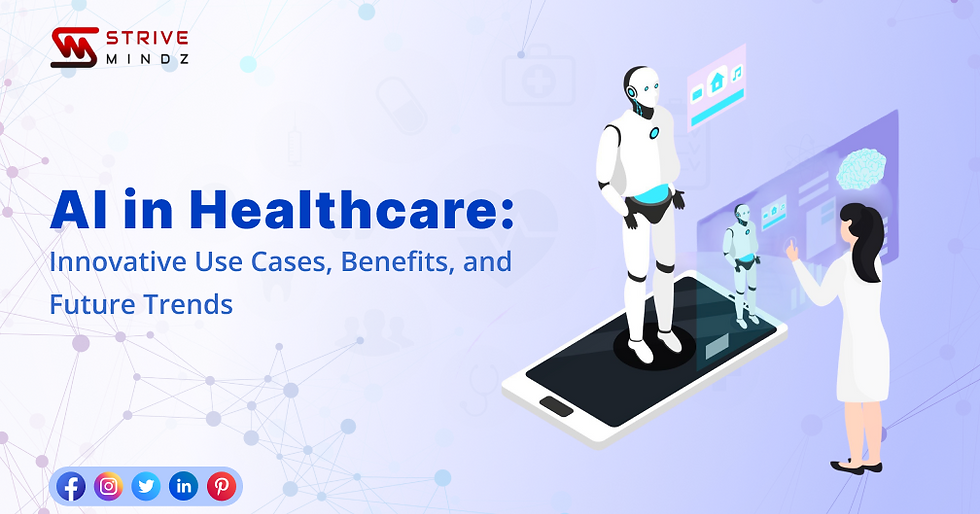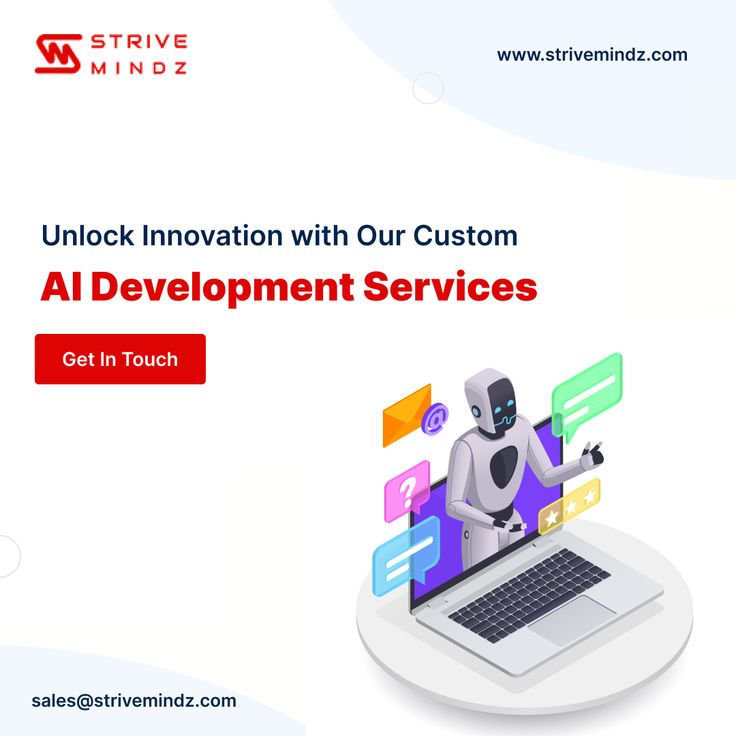How Artificial Intelligence Is Transforming the E-Commerce Industry
- Strivemindz Pvt. Ltd.

- Jul 14
- 6 min read
In the world of eCommerce, AI is driving a massive transformation by enhancing customer experience, improving operational efficiency, and unlocking new business opportunities. From personalized product recommendations to smart chatbots and predictive inventory management, AI is becoming the backbone of modern online retail. As the global eCommerce market grows increasingly competitive, adopting AI has moved from being an advantage to a necessity.
Here, we'll explore how AI is revolutionizing the eCommerce space, the key areas it’s impacting, and why embracing it can future-proof any online business.
What Is AI in E-Commerce?
AI in eCommerce refers to the use of machine learning, natural language processing, data analytics, and automation to streamline and optimize various aspects of the online shopping experience. These intelligent systems learn from data, recognize patterns, and make decisions that improve with time and exposure.
Whether it’s helping customers find the right product or predicting demand for inventory, AI enables businesses to offer smarter, faster, and more personalized solutions at scale.
Key Applications of AI E-Commerce Services
1. Personalized Shopping Experience
One of the most significant impacts of AI in eCommerce is the ability to deliver personalized shopping journeys. AI systems analyze customer behavior, browsing patterns, and purchase history to recommend products that match individual preferences.
Instead of showing the same products to everyone, AI tailors the online store for each user, just like a personal shopper. This not only improves customer satisfaction but also increases average order value and conversion rates.
2. AI-Powered Chatbots and Virtual Assistants
AI chatbots are reshaping customer service by offering instant, 24/7 assistance across websites, mobile apps, and messaging platforms. These smart bots can handle a wide range of queries—from order tracking and FAQs to returns and product suggestions.
By automating repetitive interactions, chatbots reduce support workload, speed up response times, and enhance the overall user experience. They also gather valuable data that helps in understanding customer behavior better.
3. Advanced Search and Visual Discovery
Traditional keyword search often fails to capture what users really want. AI-powered search engines, using natural language processing (NLP), understand conversational queries and deliver more accurate results.
In addition, visual search allows users to upload images and find similar products, making shopping more intuitive. These technologies reduce friction, increase user engagement, and improve conversion.
4. Dynamic Pricing Strategies
With the help of AI, online retailers can implement dynamic pricing models that adjust prices in real-time based on factors like demand, competitor pricing, seasonality, and customer behavior.
These intelligent pricing systems help businesses remain competitive while protecting profit margins. They also enable personalized offers or discounts based on user history and shopping behavior.
5. Inventory and Demand Forecasting
One of the biggest challenges in eCommerce is managing inventory effectively. Overstocks tie up capital, while stockouts lead to lost sales and poor customer satisfaction.
AI-driven demand forecasting uses historical sales data, customer trends, and external factors (like weather or events) to predict product demand. This enables more accurate stock planning, reduces waste, and streamlines logistics.
6. Fraud Detection and Risk Prevention
AI systems can detect and prevent fraudulent activities in real-time. By analyzing transaction patterns, location data, and user behavior, AI can identify anomalies that suggest fraud, such as stolen credit card use or fake accounts.
These security solutions enhance customer trust and protect businesses from financial losses and chargebacks.
7. Smarter Marketing and Customer Retention
AI tools enable businesses to segment audiences more effectively, personalize email marketing, and target ads with precision. By analyzing customer data, AI determines the best time, platform, and message to reach each user.
It also helps in predicting customer churn and recommending actions to retain high-value shoppers, leading to more efficient marketing campaigns and better ROI.

Benefits of AI in E-Commerce
Implementing AI into an eCommerce platform brings a wide array of benefits:
Increased Conversion Rates: Personalized recommendations and smoother user journeys lead to more purchases.
Better Customer Experience: Instant support, intelligent search, and tailored offers improve satisfaction and loyalty.
Operational Efficiency: Automated tasks reduce manual work and human error.
Data-Driven Decisions: AI provides actionable insights that support smarter business strategies.
Scalability: AI systems grow and improve with time, handling large volumes of data and interactions seamlessly.
Cost Savings: Intelligent forecasting and automation cut costs across customer support, marketing, and inventory management.
The Growing Market of AI in E-Commerce
The global AI-enabled eCommerce market is worth $8.65 billion (2025) and is expected to reach $22.60 billion by 2032.
Over 50% of eCommerce companies already use AI in some form.
AI chatbots can handle 80% of customer service queries without human intervention.
Personalized recommendations powered by AI drive up to 35% of Amazon’s revenue.
Real-World Success Stories of
1. Fashion Retailer – UK Integrated AI-powered recommendation engines and chatbot support. Result: +28% increase in average order value and 20% drop in support queries.
2. Electronics Marketplace – India Used AI for dynamic pricing and inventory forecasting. Result: +22% revenue growth in Q1 and 15% lower operational cost.
3. D2C Brand – USA Adopted AI-driven email personalization and smart marketing. Result: +40% open rate and +18% conversion rate.
These real-world outcomes demonstrate how AI isn’t just a buzzword—it’s delivering measurable business impact.
Challenges and Ethical Considerations
While the benefits of AI in eCommerce are clear, there are also some challenges to consider:
Data Privacy: Businesses must ensure AI tools comply with data protection laws like GDPR and respect user privacy.
Bias in Algorithms: Poorly trained AI models can reinforce biases, leading to unfair or discriminatory outcomes.
High Initial Investment: Developing and integrating AI can require significant upfront costs and skilled talent.
Complexity of Integration: Legacy systems may not easily integrate with modern AI tools, requiring custom development.
AI solutions for ecommerce development - to overcome these challenges, businesses must approach AI thoughtfully—with a focus on transparency, security, and ethical practices.
The Future of AI in E-Commerce
As AI technology continues to evolve, its role in eCommerce will only deepen. Some emerging trends to watch include:
Generative AI for Content Creation: Automatically generating product descriptions, ad copy, and even landing pages.
AI-Powered AR/VR Experiences: Letting users “try” products before purchasing through virtual simulations.
Voice Shopping: Seamless voice interfaces that let users browse, search, and order using smart assistants.
Hyper-Personalization: AI will deliver even more targeted experiences using real-time behavioral data.
Emotional AI: Tools that read customer sentiment and adapt communication accordingly.
These innovations will redefine how consumers interact with online stores, making shopping faster, more engaging, and more intelligent.
Frequently Asked Questions
1. What is AI in eCommerce?
AI in eCommerce refers to using technologies like machine learning and natural language processing to automate, personalize, and optimize online shopping experiences.
2. How does AI improve the online shopping experience?
AI enhances user experience by offering personalized recommendations, intelligent search, chatbots for instant support, and dynamic pricing based on user behavior.
3. What are AI chatbots, and how do they help in eCommerce?
AI chatbots are virtual assistants that handle customer queries 24/7. They reduce response time, improve satisfaction, and free up human agents for complex issues.
4. Can AI help with inventory and demand forecasting?
Yes, AI analyzes historical sales data and trends to accurately predict demand, helping businesses manage inventory, avoid stockouts, and reduce overstocking.
5. Is AI secure for handling customer transactions and data?
AI systems can detect fraud in real-time and ensure safe transactions by analyzing patterns, anomalies, and behavioral data, thus improving security and trust.
6. Is AI expensive to implement for small or medium eCommerce businesses?
While AI may require initial investment, many scalable solutions exist. Over time, AI helps reduce costs, automate operations, and increase revenue.
Final Thoughts
AI is fundamentally changing the landscape of eCommerce. From personalized experiences and smart customer service to dynamic pricing and fraud prevention, the benefits of AI are undeniable.
As customer expectations continue to rise and competition becomes fiercer, leveraging AI is no longer optional—it’s essential. Businesses that embrace AI now will not only improve their current operations but also prepare themselves for the future of digital commerce.
Whether you're just starting or already scaling your eCommerce platform, exploring the possibilities of AI can open doors to greater efficiency, profitability, and customer satisfaction. Strivemindz is your trusted partner in this AI journey. With a full suite of services, global experience, and a focus on innovation, we help brands build future-ready eCommerce platforms.



Ekattva Yogshala is a Yoga Alliance-certified yoga school in Rishikesh, offering 200 hours yoga teacher training in India. Our yoga teacher training in Rishikesh combines traditional yoga, mantra meditation, and online courses to help students live a balanced, yogic lifestyle. Visit- https://www.ekattvayogshala.com/200-hrs-yoga-teacher-training-rishikesh